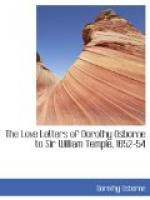The old ballad that Dorothy encloses to her lover has not been preserved with her letter. If it is older than the ballad of “The Lord of Lorne,” it must have been composed before Henry VIII.’s reign; for Edward Guilpin, in his Skialethia [1598], speaks of
Th’
olde ballad of the Lord of Lorne,
Whose
last line in King Harrie’s day was borne.
“The Lord of Learne” (this was the old spelling) may be found in Bishop Percy’s well-known collection of Ballads and Romances.
SIR,—You must pardon me, I could not burn your other letter for my life; I was so pleased to see I had so much to read, and so sorry I had done so soon, that I resolved to begin them again, and had like to have lost my dinner by it. I know not what humour you were in when you writ it; but Mr. Arbry’s prophecy and the falling down of the form did a little discompose my gravity. But I quickly recovered myself with thinking that you deserved to be chid for going where you knew you must of necessity lose your time. In earnest, I had a little scruple when I went with you thither, and but that I was assured it was too late to go any whither else, and believed it better to hear an ill sermon than none, I think I should have missed his Belles remarques. You had repented you, I hope, of that and all other your faults before you thought of dying.
What a satisfaction you had found out to make me for the injuries you say you have done me! And yet I cannot tell neither (though ’tis not the remedy I should choose) whether that were not a certain one for all my misfortunes; for, sure, I should have nothing then to persuade me to stay longer where they grow, and I should quickly take a resolution of leaving them and the world at once. I agree with you, too, that I do not see any great likelihood of the change of our fortunes, and that we have much more to wish than to hope for; but ’tis so common a calamity that I dare not murmur at it; better people have endured it, and I can give no reason why (almost) all are denied the satisfaction of disposing themselves to their own desires, but that it is a happiness too great for this world, and might endanger one’s forgetting the next; whereas if we are crossed in that which only can make the world pleasing to us, we are quickly tired with the length of our journey and the disquiet of our inns, and long to be at home. One would think it were I who had heard the three sermons and were trying to make a fourth; these are




